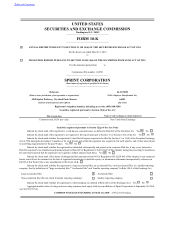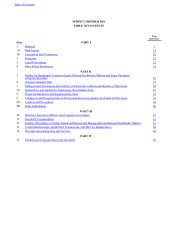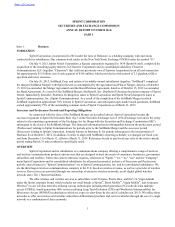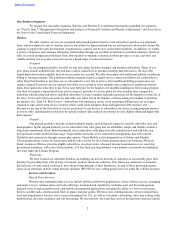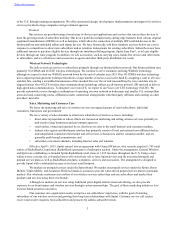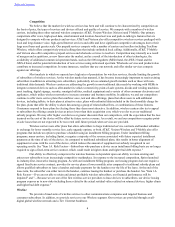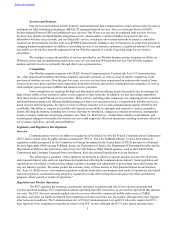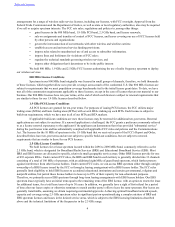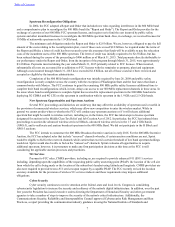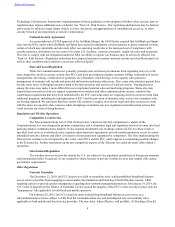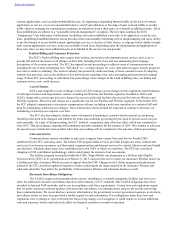Sprint - Nextel 2014 Annual Report Download - page 8
Download and view the complete annual report
Please find page 8 of the 2014 Sprint - Nextel annual report below. You can navigate through the pages in the report by either clicking on the pages listed below, or by using the keyword search tool below to find specific information within the annual report.
Table of Contents
6
arrangements for a range of wireless radio service licenses, including our licenses, with FCC oversight. Approval from the
Federal Trade Commission and the Department of Justice, as well as state or local regulatory authorities, also may be required
if we sell or acquire spectrum interests. The FCC sets rules, regulations and policies to, among other things:
• grant licenses in the 800 MHz band, 1.9 GHz PCS band, 2.5 GHz band, and license renewals;
• rule on assignments and transfers of control of FCC licenses, and leases covering our use of FCC licenses held
by other persons and organizations;
• govern the interconnection of our networks with other wireless and wireline carriers;
• establish access and universal service funding provisions;
• impose rules related to unauthorized use of and access to subscriber information;
• impose fines and forfeitures for violations of FCC rules;
• regulate the technical standards governing wireless services; and
• impose other obligations that it determines to be in the public interest
We hold 800 MHz, 1.9 GHz and 2.5 GHz FCC licenses authorizing the use of radio frequency spectrum to deploy
our wireless services.
800 MHz License Conditions
Spectrum in our 800 MHz band originally was licensed in small groups of channels, therefore, we hold thousands
of these licenses, which together allow us to provide coverage across much of the continental U.S. Our 800 MHz licenses are
subject to requirements that we meet population coverage benchmarks tied to the initial license grant dates. To date, we have
met all of the construction requirements applicable to these licenses, except in the case of licenses that are not material to our
business. Our 800 MHz licenses have ten-year terms, at the end of which each license is subject to renewal requirements that
are similar to those for our 1.9 GHz licenses described below.
1.9 GHz PCS License Conditions
All PCS licenses are granted for ten-year terms. For purposes of issuing PCS licenses, the FCC utilizes major
trading areas (MTAs) and basic trading areas (BTAs) with several BTAs making up each MTA. Each license is subject to
build-out requirements, which we have met in all of our MTA and BTA markets.
If applicable build-out conditions are met, these licenses may be renewed for additional ten-year terms. Renewal
applications are not subject to auctions. If a renewal application is challenged, the FCC grants a preference commonly referred
to as a license renewal expectancy to the applicant if the applicant can demonstrate that it has provided "substantial service"
during the past license term and has substantially complied with applicable FCC rules and policies and the Communications
Act. The licenses for the 10 MHz of spectrum in the 1.9 GHz band that we received as part of the FCC's Report and Order,
described below, have ten-year terms and are not subject to specific build-out conditions, but are subject to renewal
requirements that are similar to those for our PCS licenses.
2.5 GHz License Conditions
We hold licenses for or lease spectrum located within the 2496 to 2690 MHz band, commonly referred to as the
2.5 GHz band, which is designated for Broadband Radio Services (BRS) and Educational Broadband Service (EBS). Most
BRS and EBS licenses are allocated to specific, relatively small geographic service areas. Other BRS licenses provide for one
of 493 separate BTAs. Under current FCC rules, the BRS and EBS band in each territory is generally divided into 33 channels
consisting of a total of 186 MHz of spectrum, with an additional eight MHz of guard band spectrum, which further protects
against interference from other license holders. Under current FCC rules, we can access BRS spectrum either through outright
ownership of a BRS license issued by the FCC or through a leasing arrangement with a BRS license holder. The FCC rules
generally limit eligibility to hold EBS licenses to accredited educational institutions and certain governmental, religious and
nonprofit entities, but permit those license holders to lease up to 95% of their capacity for non-educational purposes.
Therefore, we primarily access EBS spectrum through long-term leasing arrangements with EBS license holders. Our EBS
spectrum leases typically have an initial term equal to the remaining term of the EBS license, with an option to renew the lease
for additional terms, for a total lease term of up to 30 years. In addition, we generally have a right of first refusal for a period
of time after our leases expire or otherwise terminate to match another party's offer to lease the same spectrum. Our leases are
generally transferable, assuming we obtain required governmental approvals. Achieving optimal broadband network speeds,
capacity and coverage using 2.5 GHz spectrum relies in significant part on operationalizing a complex mixture of BRS and
EBS spectrum licenses and leases in the desired service areas, which is subject to the EBS licensing limitations described
above and the technical limitations of the frequencies in the 2.5 GHz range.

